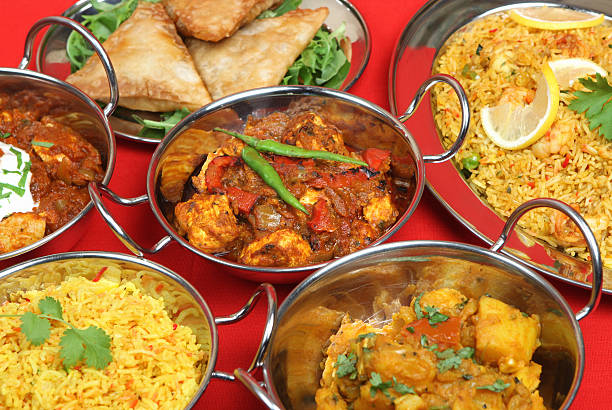Dahi Bhindi
Bhendi provides many key nutrients that are helpful for managing blood pressure. The coriander, cumin, and besan add the flavour. You only need a pinch of salt to be added to this healthy, tasty, mouth-watering dish while keeping the oil usage to a minimum.
Indian dishes include a broad variety of distinct regional foods, which cover an equally vast range of unique traditions spread across the Indian subcontinent. But there's one thing they all have in common: delicious and healthy vegetarian options.
Indian dishes include a broad variety of distinct regional foods, which cover an equally vast range of unique traditions spread across the Indian subcontinent. But there's one thing they all have in common: delicious and healthy vegetarian options.
What Causes High Blood Pressure?
According to a 2013 article in Current Hypertension Reports, high blood pressure can develop as a result of both genetic and environmental factors. However, there's evidence from animal and human studies that link dietary choices to high blood pressure. The good news is that changes in our diet can prevent high blood pressure and lower it if it's already too high.What Is a Vegetarian?
Someone is considered to be a vegetarian if they avoid meat and eat mostly plant-based foods. Plant-based foods include all vegetables, fruits, grains, and legumes (beans and peas). There are several different diets that are considered vegetarian, with some vegetarians also including certain dairy products, eggs and even fish in their diet.
Vegetarian Indian Foods and the DASH Diet
According to the Mayo Clinic, the Dietary Approaches to Stop Hypertension (DASH) diet is an effective way to reduce high blood pressure by changing what we eat.
The DASH diet is a plant-heavy diet, that includes lots of fruits, vegetables, nuts, low-fat and non-fat dairy, lean meats (like chicken and fish) and heart-healthy fats. Many Indian dishes easily meet (or can be modified to meet) the DASH diet guidelines.
Indian Dishes With Magnesium and Potassium
According to this2017 article in the American Heart Association (AHA), potassium, which is found in foods like bananas, yams and avocado (common ingredients in Indian cooking),will help maintain healthy blood pressure.
Some Indian dishes that include these ingredients include:
- Pazham pori, a type of banana fritter popular in the Southern Indian region of Kerala
- Avocado Paratha, a soft Indian flatbread made with avocado
- South Indian yam curry, slow cooked with yams, carrots, cauliflower, spinach
The AHA also reports that magnesium may also lower blood pressure. Foods rich in magnesium include spinach, almonds, peanuts and cashews; also foods commonly found in many Indian dishes. Try these Indian nut dishes to get magnesium on a vegetarian diet:
- Indian cashew curry sauce, which goes well with almost any vegetable dish
- Chaat masala, made with boiled peanuts, turmeric, onions and tomatoes
- Almond korma, made with spiced almonds, tomatoes and coconut gravy
Other Vegetarian Indian Food Choices
According to an article from the Mayo Clinic, when trying to lower blood pressure through diet, also remember to include foods that are rich in fiber, calcium and protein. Try to avoid choices high in sodium and saturated fat.
Healthy vegetarian Indian options that fit this profile include:
- Legumes
- Lentils
- Dal
- Rajma
- Chaana
- Whole-grain chapati
- Brown rice
- Barley
- Nonfat milk or yogurt
- Nuts
- Seeds
- Fruits such as apples, dates and sapota
- Vegetables such as potatoes, cauliflower, tomatoes and mung bean sprouts
Vegetarian Indian Food that Isn't as Healthy
Some Indian foods that, although vegetarian, you may do better to skip if reducing blood pressure is a consideration are; spicy bonda (deep fried vegetables), the sweet, donut-like, rice flour confection called ariselu and the fried bread puffs called Chole bhature. The high fat and sugar content of these foods may encourage weight gain, which can raise blood pressure.
Things to Avoid With High Blood Pressure
Diet isn't the only thing that can affect our blood pressure. Too much salt, certain habits, exercise and our weight can also influence it.
The Centers for Disease Control and Prevention (CDC) recommends that we get no more than about 2,300 milligrams of sodium daily to control blood pressure. The CDC also cautions to avoid:
- Smoking
- Drinking alcohol excessively
- Not getting regular exercise







